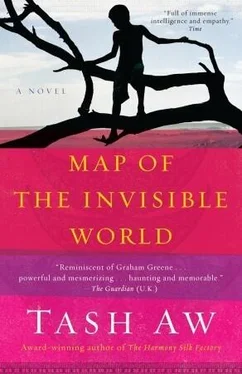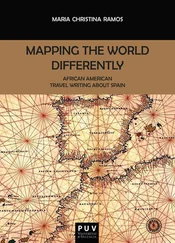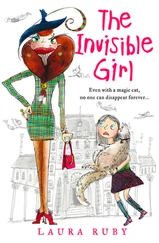Tash Aw - Map of the Invisible World
Здесь есть возможность читать онлайн «Tash Aw - Map of the Invisible World» — ознакомительный отрывок электронной книги совершенно бесплатно, а после прочтения отрывка купить полную версию. В некоторых случаях можно слушать аудио, скачать через торрент в формате fb2 и присутствует краткое содержание. Год выпуска: 2010, Издательство: Spiegel & Grau, Жанр: Современная проза, на английском языке. Описание произведения, (предисловие) а так же отзывы посетителей доступны на портале библиотеки ЛибКат.
- Название:Map of the Invisible World
- Автор:
- Издательство:Spiegel & Grau
- Жанр:
- Год:2010
- ISBN:нет данных
- Рейтинг книги:4 / 5. Голосов: 1
-
Избранное:Добавить в избранное
- Отзывы:
-
Ваша оценка:
- 80
- 1
- 2
- 3
- 4
- 5
Map of the Invisible World: краткое содержание, описание и аннотация
Предлагаем к чтению аннотацию, описание, краткое содержание или предисловие (зависит от того, что написал сам автор книги «Map of the Invisible World»). Если вы не нашли необходимую информацию о книге — напишите в комментариях, мы постараемся отыскать её.
comes an enthralling novel that evokes an exotic yet turbulent place and time—1960s Indonesia during President Sukarno’s drive to purge the country of its colonial past. A page-turning story,
follows the journeys of two brothers and an American woman who are indelibly marked by the past — and swept up in the tides of history.
Map of the Invisible World — читать онлайн ознакомительный отрывок
Ниже представлен текст книги, разбитый по страницам. Система сохранения места последней прочитанной страницы, позволяет с удобством читать онлайн бесплатно книгу «Map of the Invisible World», без необходимости каждый раз заново искать на чём Вы остановились. Поставьте закладку, и сможете в любой момент перейти на страницу, на которой закончили чтение.
Интервал:
Закладка:
“We can’t stay any longer,” Margaret said. “We haven’t got much time. We need to get out while the embassy can still help us. God knows how much longer the U.S. is going to maintain diplomatic relations with Indonesia. We aren’t the most popular people here at the moment.”
Adam looked out the window. The early evening air was still warm and unsoothing. “When I was small I used to dream about going abroad. I used to read stories about children living in Europe and imagine what it would be like to live among them. My father used to say, Son, you have no idea, it’s better here. I always thought it could not be better here. Now I’m not so sure. I don’t know what it’s like in Europe or America, or even Malaysia, but I don’t want to go. I’ve heard your explanations and I agree with you, but I still don’t want to leave. There’s no logic, I know. I’m stupid. I guess my father was right — you can’t control the future. You just have to take what comes.”
Margaret could find no argument to counter this. There was no reason for her to take him away from Indonesia, yet she had no choice. The campus was dark and silent, except for the rhythmic banging of a tin door at the far end of the badminton courts. In the distance, at that undefined place where the range of solid university buildings gave way to the flimsy shacks of the semi-slums, they could see a few kerosene lamps, their lonely dim lights revealing a few figures moving in the shadows. There was a Western song playing: “Smoke Gets in Your Eyes,” Margaret thought, though she could not be sure. Thin clouds of insects had gathered above the drains, anticipating the showers that would become more frequent from now on; but Margaret would not be in this city for the coming rainy season, she thought, nor, perhaps, for any other.
They went up the flight of stairs to her office. The barricade of piled-up desks had been removed, leaving nothing but splinters and iron bars on the floor. The door to Margaret’s office was ajar, and when Margaret tried to switch on the light she found that there was no electricity. In the last remnants of the evening light she could discern the clear, pale space where Din’s desk had stood on the far side of the room. The piles of paper on her desk had been shifted around, and several sheets had fallen to the floor, where some of her books and files lay scattered haphazardly. The only thing missing seemed to be the blue and white jar that had held her pens and pencils. She went around the desk and sat in the chair, reaching down for the lowest drawer. Even in the dark, she had no trouble finding the crevice that sheltered the key; she unlocked the bottom drawer, her fingers feeling the ample mound of paper that was her thesis. She wondered why she had kept it for so long; at this point, it seemed a ridiculous object, a dead thing, a hindrance. She pushed it aside and felt around for her passport. On the way here, she had, just briefly, wondered what she would do if the passport was missing. She had given it so little thought, been so casual in her treatment of it, but now she’d found herself praying that it would be there; thank god, it was.
It took a while for them to find their way back to the car. Stripped of all light and movement, the campus buildings did not seem to be where they usually were. The embassy driver was standing by the Buick; they could see the pinprick glow of his cigarette. He had left the engine running, and when he saw them approaching he got into the car and put his hands on the steering wheel. “I got a call on the radio. Mr. Schneider says don’t come to the embassy. I am to take you to this address.” He passed them a piece of paper as the car reversed sharply before taking off again. Margaret could not make out the handwriting. “Mr. Schneider says come quick, no time to lose.”
32
O nce, when Adam was still very young, he’d gone for a walk on his own, along the rocky shoreline near the house. He must have been playing truant, for it was in the middle of the day, the sun slicing through the scant canopy of the scrubby seaside forest. And it had to have been a good few years after he’d arrived at Karl’s house, for he’d walked without hesitation or fear, scrambling over the patches of slippery rock that had become familiar to him. He recalls this now, his ease with his surroundings, his feeling of intimacy with the trees and the water and the sand. He had walked for some distance when he saw Karl about twenty yards from the shoreline, sitting on a fallen tree trunk, half-hidden by the shade of some shrubs. He was bent over slightly, concentrating on a book, or a sheet of paper, looking up occasionally to squint at the sea.
Adam slowed down immediately, trying to tread as lightly as possible, but the crunch of dead leaves and coarse sand underfoot seemed to reverberate every time he put a foot down. He considered turning back and running away — the risk of being discovered was too great. But there was something in Karl’s actions, the intensity with which he looked at those papers, that made Adam curious. He skirted around in a wide arc, moving farther inland so that Karl would not see him, but the noise he made as he pushed his way slowly through the undergrowth was considerable: Karl must have heard. And yet Karl did not once look inland, in the direction of the rustling foliage, focusing instead on the sheet of paper in his lap. From a slightly elevated position, Adam saw that Karl was drawing, his hand moving fluently across the page, sometimes in long smooth strokes, other times in tiny precise flicks. He had never seen Karl do this before and was amazed at the delicacy of his father’s hands, which he had only ever seen wielding a machete or an ax or a broom. He could not, from where he was hiding, make out the shapes in the drawing, so he began to inch closer, until he was certain that Karl would turn around and confront him. He had thrown all caution to the wind: He just wanted to know what Karl was drawing. At last he could see, over Karl’s shoulder, a low ridge of penciled hills, a house perched precariously on a slope. He came closer still. There was one person in the drawing, a young person, though Adam could not quite make out if it was a boy or a girl. Its features were exaggerated but clearly Western. It was a girl, Adam decided.
“Who’s that, Pak ?” Adam said. It no longer mattered to him that he would be found out.
When Karl turned it was clear that he’d had no idea of Adam’s presence. He frowned and blushed and smiled, all at once. “I thought you were at school,” he said. There was a look on his face that Adam recognized because it was something he was all too familiar with: shame.
“Who’s that?” Adam said, pointing at the sheet of paper.
Karl looked at the drawing for a few moments and then he laughed loudly, folding it in half with one neat movement. “Oh, that’s nothing, I was just, um, bored … playing around. Look — see what your father can do with this simple sheet of paper!” And with a few deft folds he turned the drawing into a paper boat. “Come on!” he said, and ran down to the beach. He waded into the shallows, his thin trousers getting wet up to the knee. He set the boat gently on the calm afternoon waves. The little vessel rocked back and forth for a few seconds before being overcome by the swell.
As he walked home with Karl, Adam did not think about the drawing, or about Karl’s embarrassment at having been discovered. He was merely thankful to have avoided a reprimanding for having skipped school. But now he recalls experiencing a quite distinct feeling, something more powerful than relief: that of being forgiven.
He does not know why he felt like this, because he had, in retrospect, committed no great crime. He only knows that life with Karl amounted to one long act of forgiveness. It was as if he was being excused for all the nameless things he had done wrong, all the things he could not remember.
Читать дальшеИнтервал:
Закладка:
Похожие книги на «Map of the Invisible World»
Представляем Вашему вниманию похожие книги на «Map of the Invisible World» списком для выбора. Мы отобрали схожую по названию и смыслу литературу в надежде предоставить читателям больше вариантов отыскать новые, интересные, ещё непрочитанные произведения.
Обсуждение, отзывы о книге «Map of the Invisible World» и просто собственные мнения читателей. Оставьте ваши комментарии, напишите, что Вы думаете о произведении, его смысле или главных героях. Укажите что конкретно понравилось, а что нет, и почему Вы так считаете.












